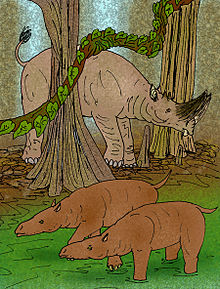石炭兽科
外观
| 石炭兽科 | |
|---|---|

| |
| 埃及重脚兽(上)及Bothriogenys fraasi(下) | |
| 科学分类 | |
| 界: | 动物界 Animalia |
| 门: | 脊索动物门 Chordata |
| 纲: | 哺乳纲 Mammalia |
| 目: | 偶蹄目 Artiodactyla |
| 演化支: | 全撰类 Artiofabula |
| 演化支: | 鲸反刍类 Cetruminantia |
| 演化支: | 鲸凹齿形类 Cetancodontamorpha |
| 亚目: | 鲸河马形亚目 Whippomorpha |
| 下目: | 凹齿下目 Ancodonta |
| 总科: | 河马总科 Hippopotamoidea |
| 科: | †石炭兽科 Anthracotheriidae |
| 亚科及属[1][2] | |
石炭兽科(Anthracotheriidae),又名炭兽科,是已灭绝及像河马的偶蹄目动物,与河马及鲸豚有关。当中最古老的Elomeryx首先于始新世中期在亚洲出现,并在非洲及欧亚大陆生存,于渐新世进入了北美洲,及后可能是因气候转变及与河马和猪竞争[3],于中新世在欧洲及非洲消失。最年轻的Merycopotamus于上新世晚期在亚洲消失。这个科是以最先发现的石炭兽来命名,是因这些化石是在法国的古新世煤床发现。
石炭兽科像较瘦的河马,头部较细小窄[4]。它们每只脚上有四或五趾,宽阔的脚掌适合在软泥上行走。它们有完整的牙齿,一些物种适合挖出水中植物的根。[5]
演化关系
[编辑]

有证据显示石炭兽类,作为河马的亲属[6],有可能是鲸鱼祖先的近亲。[7][8]但是,最早的石炭兽科只是于始新世中期出现,是古鲸小目在完全进入水中生活的时期之后。
参考
[编辑]- ^ Kron, D.G., B.; Manning, E. Anthracotheriidae. Janis, C.M.; Scott, K.M.; and Jacobs, L.L. (eds.) (编). Evolution of Tertiary mammals of North America. Cambridge: Cambridge University Press. 1998: 381-388. ISBN 0521355192.
- ^ Lihoreau, Fabrice and Jean-Renaud Boisserie, et alia. PDF Anthracothere dental anatomy reveals a late Miocene Chado-Libyan bioprovince 请检查
|url=值 (帮助) (PDF). Proceedings of the National Academy of Sciences. [2008-04-09]. (原始内容存档 (PDF)于2007-10-01). - ^ Archived copy. [2009-04-30]. (原始内容存档于2009-03-19).
- ^ Allaby, Michael. Anthracotheriidae. A Dictionary of Zoology. Encyclopedia.com. 1999 [15 Apr 2009]. (原始内容存档于2016-03-03).
- ^ Palmer, D. (编). The Marshall Illustrated Encyclopedia of Dinosaurs and Prehistoric Animals. London: Marshall Editions. 1999: 268. ISBN 1-84028-152-9.
- ^ Boisserie, Jean-Renaud; Fabrice Lihoreau and Michel Brunet. The position of Hippopotamidae within Cetartiodactyla. Proceedings of the National Academy of Sciences. February 2005, 102 (5): 1537–1541 [2007-06-09]. (原始内容存档于2018-11-20).
- ^ Gatesy, J. More DNA support for a Cetacea/Hippopotamidae clade: the blood-clotting protein gene gamma-fibrinogen. Molecular Biology and Evolution: 537–543. [2008-04-09]. (原始内容存档于2010-05-05).
- ^ Ursing, B.M.; U. Arnason. Analyses of mitochondrial genomes strongly support a hippopotamus-whale clade. Proceedings of the Royal Society. 1998, 265 (1412): 2251.
